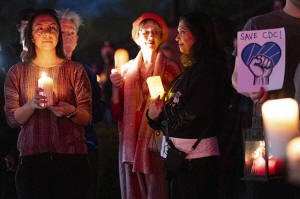Kennedy remains quiet on 10,000 jobs lost at the nation's top health
department
[April 04, 2025]
By AMANDA SEITZ
WASHINGTON (AP) — Secretary Robert F. Kennedy Jr. offered no new details
Wednesday about his massive restructuring of the U.S. Department of
Health and Human Services, the day after thousands of layoffs ricocheted
through its agencies, hollowing out entire offices around the country in
some cases.
Kennedy's silence is prompting questions from Republican and Democratic
lawmakers alike, with a bipartisan request for President Donald Trump's
health secretary to appear before a Senate committee next week to
explain the cuts.
As many as 10,000 notices were sent to scientists, senior leaders,
doctors, inspectors and others across the department in an effort to cut
a quarter of its workforce. The agency itself has offered no specifics
on which jobs have been eliminated, with the information instead coming
largely from employees who have been dismissed.
“This overhaul is about realigning HHS with its core mission: to stop
the chronic disease epidemic and Make America Healthy Again,” Kennedy
said on social media, in his only comments addressing the layoffs so
far. "It’s a win-win for taxpayers, and for every American we serve."
The move, the department has said, is expected to save $1.8 billion from
the agency’s $1.7 trillion annual budget — about one-tenth of 1%.

The department has not released final numbers but last week said it
planned to eliminate 3,500 jobs from the Food and Drug Administration,
2,400 jobs at the Centers for Disease Control and Prevention, and 1,200
from the National Institutes of Health. Public health experts and top
Democrats have raised alarms about how the deep cuts — about 25% of the
department — will affect food and prescription drug safety, medical
research and infectious disease prevention.
Still unclear is why certain jobs were eliminated and others were
spared.
As the cuts were underway on Tuesday, Louisiana Sen. Bill Cassidy, a
Republican, and Vermont Sen. Bernie Sanders, an independent who caucuses
with Democrats, sent a letter to Kennedy calling him before the Senate's
health committee. In a statement, Cassidy said Kennedy's appearance is
part of his promise to appear quarterly before the committee.
“This will be a good opportunity for him to set the record straight and
speak to the goals, structure and benefits of the proposed
reorganization,” Cassidy's statement said.
[to top of second column]
|

People gather for a candlelight vigil in support of the Centers for
Disease Control and Prevention in front of its headquarters in
Atlanta, Friday, March 28, 2025. (AP Photo/Ben Gray)

Rep. Diana Harshbarger, a Republican from Tennessee, said the House's
health subcommittee also has questions about job cuts.
“We're going to find out what the layoffs were all about — 10,000 — we
didn't know it,” Harshbarger said Wednesday at a health care forum
hosted by Politico. “We're going to find out what the premise was for
those layoffs.”
At the same event, special government employee Calley Means, a close
adviser to Kennedy who is working at the White House, defended the cuts.
He struggled, however, to offer an explanation on how the overhaul will
improve Americans' health. Some of his claims were met with shouts and
hisses.
“The system is really on the wrong track,” Means said, later adding that
he wants to see more research from the NIH.
Politico's Dasha Burns pressed Means on how the NIH would conduct more
research with fewer employees at the agency, which had fired more than
1,000 NIH scientists and other staff before this week's layoffs. Trump's
Republican administration has yanked hundreds of NIH grants and delayed
hundreds of millions of dollars — as tallied on the HHS’ own website —
in continuing or new research funds including for studies of cancer and
to keep Alzheimer’s centers around the country running.
Means responded by asking: “Has NIH funding been slashed?”
He went on to say the Trump administration will put more money directly
into the hands of scientists with its plan to cap “indirect costs” of
research grants at 15%, although scientists at hospitals and
universities have argued that the cap cuts money that is crucial to
conducting studies.
All contents © copyright 2025 Associated Press. All rights reserved
 |